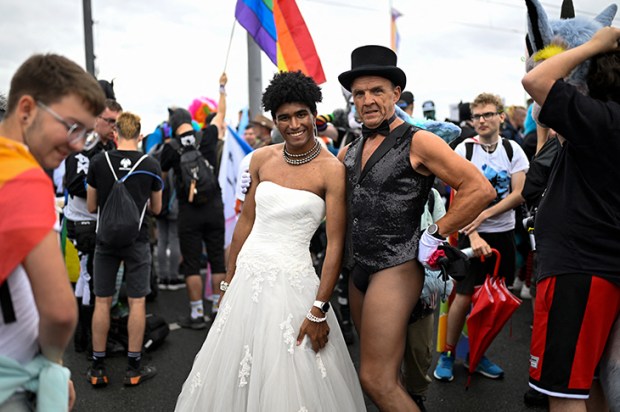In last week’s edition, Rebecca Weisser had a powerful piece about Glastonbury and the appalling behaviour of some of the performers, and the crass stupidity of the BBC to allow some segments to go to air. She made some pretty uncontroversial – indeed, in my view, unarguable – points. And yet, she attracted a number of surprisingly unfavourable online comments, one of which I reproduce below. The commentator, let’s call him Fred, opined:
‘If you support free speech, and I do, you have to put up with stupid speech that you find offensive… free speech is useless if we only allow those we agree with to speak… stop and think before agreeing to many limits on free speech….’
This highlights a fundamental misunderstanding of the concept of free speech, one which is increasingly common.
Contrary to the opinion above, you do not have to put up with speech that you find offensive. The right to free speech does not guarantee anyone a platform and it does not protect them from any consequences. All it does is decree that, with some limitations, you cannot be prosecuted for what you say. It does not mean you should suffer no consequences. It does not mean that Ms Weisser must refrain from exercising her own freedom of expression, in the interest of some absolutist view of free speech.
Adam Creighton, in a recent Australian article, takes the same view as Rebecca’s critics. He points out that conservatives have previously deplored the provisions of section 18C, writing:
‘Almost 15 years ago, conservative political forces erupted in fury when columnist Andrew Bolt was convicted of contravening section 18C of the Racial Discrimination Act… Calls to abolish 18C rang out across the land… there were a flurry of quotes pointing out that free speech, however odious, was a fundamental human right that should underpin Australian society. If you’re offended, toughen up. The law can’t be based on feelings, the arguments went….’
But, he adds, ‘All the arguments in favour of free speech and against 18C were as laudable and correct then as they are now. So-called hate speech laws are infantilising and deny human agency. Yet I won’t be holding my breath for conservative political forces to mount a principled defence of the contemptible preacher Wassim Haddad, who this week was convicted under 18C for making “disparaging imputations about Jewish people” in a series of lectures in Bankstown in 2023.’
I will return to Creighton and section 18C shortly, but before I do, here’s Chris Merritt, arguably our best writer on legal affairs, from the same edition of that paper, commenting on the Wassim Haddad case:
‘What we are facing is not merely an epidemic of hate speech against Jews, but the normalising of public discourse that creates an imminent risk of violence. Those responsible are doing so with impunity. There is no law that could be used by police to crack down on those who create an imminent risk of violence. No society can be expected to tolerate such a clear gap in the law. The problem is that much of the community, including many politicians, continue to view this as a free-speech issue when it’s really about personal safety.’
Clearly, Mr Merritt sees Haddad’s statements as incitement. The Israelis understand this. Hence, they didn’t wait until Iran actually had a bomb before acting. The dramatic increase in invective against Jews may not, in every instance, amount to a clear case of incitement to violence, but it definitely contributes to the ‘enrichment’ process. Britain and France, for example, are close to having weapons-grade antisemitism, if they are not already there.
And now we have another arson attack on a Melbourne synagogue, in which 20 people were having Shabbat dinner, and a mob besieging a Jewish restaurant. As the Australian reported, ‘Less than 2 km from the synagogue, in a separate incident, a group of about 20 anti-Israel activists targeted Miznon restaurant in Hardware Lane reportedly chanting “death to the IDF”.’
‘Death to the IDF’. I wonder where they got that from? So, it seems we too have weapons-grade antisemitism. Fred above asked, ‘Is chanting “death, death to the IDF” inciting violence? The argument can be made that it is, but seriously does anyone expect any of these idiots to take on the Israeli military; it is performative nonsense.’
Well, Fred, you are right. No one expects these cowardly scum to take on the IDF, but it seems they have identified a convenient proxy. As did the ‘idiot’ who murdered two Israeli diplomats in Washington, DC two months ago.
Which brings me back to section 18C of the Racial Discrimination Act. As Mr Creighton notes, conservatives uniformly regard this as bad law. It casts a serious pall over free speech, as Andrew Bolt discovered. But to equate the Bolt case with Haddad’s is absurd.
Fundamentally, free speech is about political opinion.
Contrary to the beliefs of many absolutist free speech defenders, you do not, or should not, have a right to gratuitous personal abuse which is not underpinned by some logical, or even illogical, argument. I am not suggesting you should be prosecuted for this (other than via defamation action), but that aggrieved persons should be able to take whatever action is within their power to counter your attack.
Slogans such as ‘death, death to the IDF’ are nothing more than rabble-rousing. They are inflammatory but they are not making an argument. They do not contribute to a civil discourse. That is not to say a civil discourse must always be polite. It can, and often will, become heated and how to determine when it has crossed the line is problematical. I would suggest that one good sign the line has been crossed is use of the phrase ‘death to’.
Back to Mr Creighton. Wisely, he is ‘not holding my breath for conservative political forces to mount a principled defence of the contemptible preacher Wassim Haddad…’.
And why should they? Let’s accept that the Racial Discrimination Act is a well-intentioned law, but that its drafting, particularly 18C, is appalling. It allowed a well-considered, well-argued and temperate opinion of Andrew Bolt to be deep-sixed. But there must be some cases which fall under 18C that are egregious. Calling a certain group of people descendants of ‘pigs and monkeys’ clearly falls within the original intent of 18C, and the finding against Haddad is not simply a perverse unintended consequence of a badly drafted law. Why should conservatives be upset about that?
Creighton finishes his piece opining, ‘In a multicultural society, individuals will disagree and even hate each other for despicable reasons. Litigating over hurt feelings is a shocking waste of resources. The bottom line is, as a society, we need to toughen up.’
Yes, Jewish Australians – even though you have contributed to this nation since the First Fleet and even though your families and friends are being murdered in Israel, and elsewhere, and your synagogues being torched by the very forces these wielders of free speech are promoting – apparently you now need to ‘toughen up’.
Got something to add? Join the discussion and comment below.
You might disagree with half of it, but you’ll enjoy reading all of it. Try your first month for free, then just $2 a week for the remainder of your first year.













